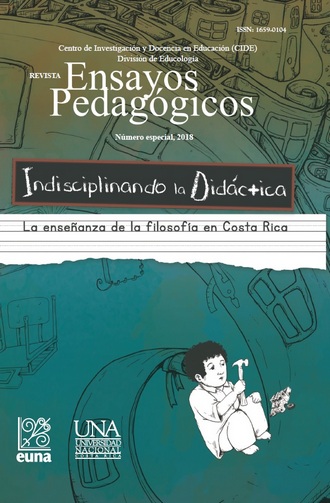Education, Community, and Liberation. Comments from the Pedagogical Thought of Paulo Freire and Alejandro Cerletti: Contributions to the Teaching of Philosophy
DOI:
https://doi.org/10.15359/rep.esp-18.8Keywords:
education, community, liberation, Paulo Freire, Alejandro CerlettiAbstract
In this paper, we will give some criteria on the importance of the community as a total social fact necessary to achieve an education that, in addition to being critical and rigorous, is, in turn, pertinent, significant and transformative. For this, we analyze the proposals of Paulo Freire and Alejandro Cerletti to problematize reality through the emergence of the other, or to learn through our questions, considering students from a subject-subject relationship and not as objects of education, who from their reality and needs, can assume education as a liberation process where philosophy plays a fundamental role.
References
Adorno, T. (1999). Educación para la emancipación. España: Morata.
Althusser, L. (1988). Ideología y aparatos ideológicos del Estado. Argentina: Nueva Visión.
Bazán, D. (2008). El oficio del pedagogo. Aportes para la construcción de una práctica reflexiva en la escuela. Argentina: HomoSapiens.
Bauman, Z. (2004). Modernidad líquida. Argentina: EFE.
Butler, J. (1997). Mecanismos psíquicos del poder; teorías sobre la sujeción. España: Cátedra
Cerletti, A. (2015). Didáctica aleatoria de la filosofía, dialéctica del aprendizaje filosófico. En A. Cerletti y A. Couló (edit.), Didácticas de la filosofía Entre enseñar y aprender a filosofar (pp. 15-32). Argentina: Novedades educativas.
Cerletti, A. (2016). Repetición, novedad y sujeto en la educación: un enfoque filosófico y político. Argentina: Serie del Estudiante.
Dussel, E. (2015). Filosofía del Sur: Descolonización y transmodernidad. México: Akal.
Freire, P. (2003). El Grito Manso. Argentina: Siglo XXI.
Freire, P. (2005). Pedagogía del Oprimido. Quincuagésima sexta edición. México: Siglo XXI.
Freire, P. y Faundez, A. (2013). Pedagogía de la pregunta: crítica a una educación basada en respuestas a preguntas inexistentes. Argentina: Siglo XXI.
Hegel, G. (2008). Fenomenología del espíritu. México: EFE.
Heidegger, M. (2012). El ser y el tiempo. Argentina: EFE.
Kant, I. (2012). Contestación a la pregunta: ¿qué es la ilustración? México: Taurus.
Lévinas, E. (2009). Descubriendo la existencia con Hursserl y Heidegger. España: Editorial Síntesis.
Marx, K. (1981). El Capital. Tomo I. Cuba: Editorial de Ciencias Sociales.
Marx, K. (2008). Contribución a la crítica de la economía política. Novena edición. México: Siglo XXI.
May, R. (2004). Ética y medio ambiente: hacia una ética sostenible. Costa Rica: DEI.
Rancière, J. (2003). El maestro ignorante. España: LAERTES
Singer, P. (1999). Liberación animal. España: Trotta.
Singer, P. (2003). Un solo mundo: la ética de la globalización. España: Paidós.
Skliar, C. (2007). La educación (que es) del otro: argumentos y desierto de argumentos pedagógicos. Argentina: Novedades Educativas.
Žižek, S. (2009). Sobre la violencia: seis reflexiones marginales. España: Paidós.
Downloads
Published
How to Cite
Issue
Section
License
Ensayos Pedagógicos is subscribed to the Attribution-NonCommertial-NoDerivatives 4.0 International Creative Commons Licence, which allows both authors and readers to freely download, store, copy, and distribute the final approved publisehd version of the manuscript (post-print) as long as this is done without commercial purposes, no derivative works are generated, and the source and author are mentioned. As well, Ensayos Pedagógicos declares that authors will remain the rightful owners of the copyrights of their work in perpetuity.







